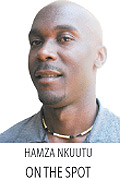There are a lot of people in this world who are willing to do whatever it takes to win, even if it means cheating--unfortunately, a lot of those people can be found in Africa.


There are a lot of people in this world who are willing to do whatever it takes to win, even if it means cheating--unfortunately, a lot of those people can be found in Africa.
Cheating is evil regardless of its form or volume —everywhere you go, whatever you do, there is some form of cheating in all walks of life but my concern here is about African football players and what has now become to be their ‘age-syndrome’.
It is no secret that African teams, particularly the youth teams are often believed to be full of overage players—age scandals have rocked several West African countries mostly Ghana, Nigeria and Senegal in the past.
But the problem is not only confined to West African players or countries but it rather cuts across the entire African face and beyond.
Our region and Rwanda in particular, is no exception when it comes to players lying about their age—actually this topic, because of its sensitivity, is capable of generating an argument that can last a year non-stop.
In 2003, the Kenyan Sports Minister took a bold step when he disbanded all Kenyan international teams after claiming that at least two members of their U-17 team had falsified their ages.
In Rwanda, the topic has been raging on for years—in fact I can bet you that in every four people discussing local football wherever they may be, the issue of players lying about their age never misses on the agenda.
I am sure even most of you have discussed this topic at one time in your everyday conversations in a bar, at work, in a taxi, at stadiums, restaurant or even at your home.
We all have heard of Rwandan players or foreigners playing in the local football league who are way older than they suggest and I can again bet you that this evil is not about to end, not now and definately not in the next decade.
Why? Poverty, limited life chances and the desire to win at all costs are contributing to an epidemic of age cheating in football, particularly in Africa and South America.
Coaches, parents, clubs, schools and the sport’s national controlling body all contribute to the growing vice by either encouraging it or turning a blind eye—no wonder a 37-year-old footballer in Rwanda or anywhere else on the continent can stand on his two legs and claim to be 24 or less!
Home case
In Rwanda or any other part of Africa, it is extremely rare to find a player using his real age, that’s why we’ll always have arguments over whether for instance Jeannot Witakenge, Manfred Kizito, Haruna Niyonzima, Labama Bokota, Hegman Ngoma, Jamal Mwiseneza, Jimmy Mulisa etcetera are as old as they tell us.
Only in Africa, South America and of course some parts of Europe that someone like Mwiseneza and almost the entire U-17 team are really U-17 or Aimable Rucogoza, Niyonzima and the entire U-20 team are really U-20!
Or further still, why give a passport with age 24 to someone you can see just on his face that he is in his late 30s? Is Bokota really as young as 24 as he claims? Try asking his club coach Rene Feller.
The Dutchman once made an interesting comment about his DR Congo-born striker and it stimulated my appetite to write about players and their stupid lies about their age.
Sport is about fairness and fair competition. Age-cheating is dishonest and reflects a corrupt value system; unfortunately, in Rwanda if you cannot make it at a young age, you must have to cheat.
But you also have to understand the social world of professional football and the dreams of many young boys to make a cut as footballers.
Poverty is the main reason among the many that drives football players to cheat and parents encourage their children to do it so that they (children) can get exposure thus getting out of poverty.
The majority of players involved in age-cheating live below the poverty line and for them cheating is the only option they have but what about the fans, who idolize these cheats!
Cheating gives the players the chance to travel and an opportunity of playing for big teams and it betters their lives. And also, clubs want to win at all cost, so they encourage it.
Money drives the issue because it can drive players from poverty. It is rife in Africa, South America and parts of Asia; it is a big challenge for football.
Unfortunately, the local football federation, Ferwafa is not regulating the issue properly and my biggest fear is that even those supposed to fight it are freely encouraging it just because it fits their short-term interests.
Another factor that further encourages age-cheating is that most Africans, not only those in sport but even you and you your neighbour don’t know exactly when they were born and they end up forging birth dates!
Contact: nku78@yahoo.com


